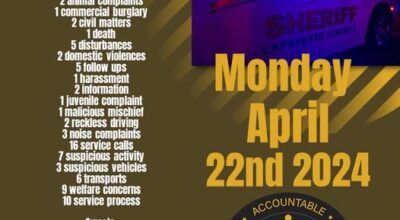Family Crisis Services Reports increase in Domestic Violence calls since COVID-19 pandemic began
Published 10:27 am Wednesday, May 6, 2020
For most people, stay-at-home orders provide a sense of security amidst the coronavirus pandemic; however, that’s not the case for victims of domestic violence.
Since March 11, when the first case of COVID-19 was reported in Mississippi, 23 domestic violence arrests have been made in Lafayette County. Ten of those arrests were in the Oxford Police Department’s jurisdiction, and 13 were in the Lafayette County Sheriff’s Department’s jurisdiction.
The initial arrest of an abuser is only one part of the story. Victims who may be quarantined with their abuser are still in need of help, which is where Family Crisis Services of Northwest Mississippi comes in. Family Crisis Services, located in Oxford, is a resource for victims of abuse in the LOU Community and surrounding area.
According to Advocate and Program Assistant Mary-Margaret Chaffe, the first line of advice for victims who are quarantined with an abuser is to be prepared.
“The action and advice that we give to victims that are quarantined with the abuser is to let law enforcement be aware of the situation before there is an emergency,” Chaffe said. “If you have people you can contact in an emergency, think about setting up ‘code words’ or phrases that could let them discreetly know that you need help if you are unable to call 911.”
Chaffe advised victims to reach out to a trusted friend, co-worker or family member who could check in with them about their safety and support needs. Sometimes that might mean code words or signals for children to know, whether that is for them to go into another room or call for help.
Having a safety plan established, even a safe room to go to in an argument that has no weapons, a room with exits to the outside or having a bag set aside with important documents, medications, money, phone and clothes can help a victim escape an abusive situation quickly.
Chaffe also endorsed CDC-recommended guidelines, like taking walks outside while maintaining social distancing, in addition to practicing some form of self-care to cope with an abusive situation, should one feel trapped.
An abusive situation is volatile no matter what is going on in the rest of the world. However, Chaffe said, victims are especially vulnerable during a pandemic, due to Stay-At-Home and shelter-in-place orders.
“The Stay-At-Home order may impact those already in volatile situations because the abuser may withhold necessary items, such as hand sanitizers and disinfectants. The abuser may withhold insurance cards or prevent survivors from seeking medical attention if they needed it,” she said. “Travel restrictions may impact survivor’s escape or safety plan. Also, an abuser may feel even more in control and escalate their isolation tactics.”
Those who suspect a friend or neighbor might be in an abusive situation are encouraged to reach out to the suspected victim virtually; survivors of abuse need someone to be supportive, listen and not to judge his or her situation, Chaffe said.
An uptick in domestic violence calls and arrests is not unique to the LOU Community. The effects of the pandemic on those in abusive situations can be seen across the country and the world. As such, many well-meaning individuals have taken to social media to identify themselves as victim advocates.
“If you’re in an abusive situation, message me about my scented candles. (I don’t sell candles.),” one post read. “If you message me asking to buy a CAMPFIRE candle, I will notify the authorities to come check on you.”
While these posts are creative, Chaffe warned that they might do more harm than good.
“Talking about social media and using code words, I see how the idea is creative, but it can also backfire in situations and make it more dangerous for the victim,” she said. “Since the code words have been put on the news and the media there is a good chance the abuser would see this. To develop code words or signals with small intimate groups might be more ideal.”
Family Crisis Services works together with many organizations to provide services to the victims they see. According to Chaffe, when they receive a call, the first thing they do is find out if the caller is safe or not. From there, they will reach out to law enforcement and/or the closest domestic violence shelter if the victim is willing or the situation is an emergency.
If someone in abusive situation wants help, they need to call 911 if they are in immediate danger. Family Crisis can provide advocacy, support, counseling and resources. All their services are free of charge and they represent 10 counties: Lafayette, Coahoma, Desoto, Marshall, Panola, Quitman, Tallahatchie, Tate, Tunica and Yalobusha.
IMPORTANT RESOURCES:
Family Crisis Services: 1-800-230-9929 (24-hour crisis hotline)
Office line: 662-234-9929
Mississippi Coalition Against Domestic Violence: 1-800-898-3234
National Coalition Against Domestic Violence: 1-800-799-SAFE (7233)
National Domestic Violence Hotline: thehotline.org (1-800-799-SAFE (7233))





